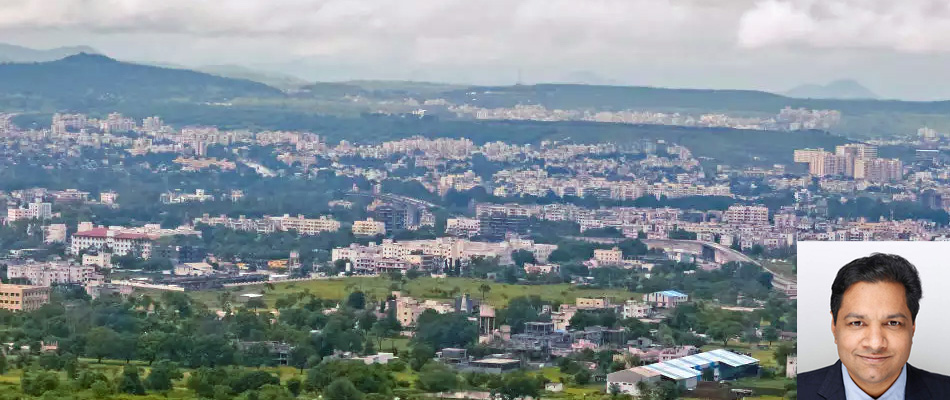Coming from Frankfurt to Pune can be a cultural shock for many, but I just fell in love with Pune city and I here I am sharing my experience of the city using the business cluster perspective (also know as Porterian cluster). Most satellite towns are usually overshadowed (somewhat overlooked) for resources, jobs, investments by the more prominent cities nearby. For instance, Chandigarh and Dehradun were dominated by Delhi for talent and investment. Mysore and Mangalore were overshadowed by Bangalore and , Kolkata overshadowed most north-eastern towns in jobs, talent, and investment. Similar is the case with Paris, Copenhagen and London in Europe, who dominated almost every town in their vicinity, taking away jobs, investment, talent, art, and culture.
Pune practically being a satellite town of Mumbai theoretically, should have been overshadowed for resources, human capital, technology, investment and jobs. However, not only did Pune survive the magnetic pull of Mumbai but counter-intuitively became a super-magnet attracting the best talent from all over the world and Mumbai. So, what makes Pune special?
Michael Porter, in his book “The competitive advantage of the nations,” introduced the term Industry cluster (known as Business Cluster, Porterian cluster, Geographic cluster) to theorize why certain towns have a competitive advantage over others. He conceptualized business clusters as a geographic concentration of interconnected businesses consisting of suppliers, buyers, talent pool, financial institutions and having strong inter-connectivity with other clusters. Well designed clusters produce jobs, economic growth and increase the competitiveness of a country. I found the city of Pune a unique business cluster(industrial, cultural, artistic) attracting talent, capital and the ability to create unique businesses and organisations.
While traveling from FLAME University campus at Lavale to FC road, and back, I am captivated by the number of high-tech research institutes of national esteem such as ARDE, India Metrological Research Institute, among others. Apart from generating cutting-edge research, these institutions are a source of the talent pool of engineers and researchers who can capture “market-alpha” faster than most investors and analysts. The presence of these highly trained researchers increases the competitiveness of Pune. Pune is one of the first manufacturing hubs of Independent India, a position it continues to uphold. Kirloskar, Bajaj and Tata started their manufacturing plants in Pune. These firms are globally competitive, producing high-value products for a globalmarket. The talent pool produced at the central government institutions is readily employed by these top-notch firms for research, development and innovation. This leads to sustainable high-value economic value creation, where the demand side and the supply side are synced for higher value creation.
Pune is known as the oxford of India and rightly so. Driven by its colonial past, military history and manufacturing history, combined with a strong requirement of highly skilled and technologically advanced human capital, Pune has invested heavily in heavily in creating high-value human capital and creating engineering and premier higher education institutions. . Some of the best schools in India are located in Pune. Driven by n Both the strong demand by its industries and high-quality supply of technical human capital further increases the value of Pune as a Porterian cluster. Furthermore, the clustering of supply-side institutions and demand-side markets and industries form the ideal ground for opportunity recognition, innovation and entrepreneurship.
What comes to your mind when you think of a place with military camps, high-tech research institutes, highly trained engineers and good weather? Silicon Valley. Similarly, Pune also has the right mix of all of the above, therefore, making it an ideal town for ITES. The presence of highly trained, high-tech skilled human capital and industry, which can readily test and apply their ideas form the basis for Pune’s (along with Bangalore) ability to capture the global ITES market.Some of the top global ITES firms are based out of Pune. Good weather and competitive (relatively lower) cost of living make the city home to top Indian IT talent and aligned to the needs of the knowledge economy. Highly trained engineers turned entrepreneurs from Pune have established competitive ITES firms, start- ups providing cost-effective high-tech services to global clients.
Quoting Protagonist from the Dead poets’ society “Medicine, law, business, engineering, these are noble pursuits and necessary to sustain life. But poetry, beauty, art, romance these are what we stay alive for”. This sums up how Pune has maintained its unique contribution to Indian art and cinema by producing some of the most talented artists. The FTII and the Pune theatre community has given India and the world some of the finest artists. Pune has a unique food culture, a potpourri of Mumbai – Persian food, European bakery culture, South-Indian, and Marathi Food. On top of all of it, I love its unique cafes and tea-cafes and relate to its love for masala chai. Pune an economic cluster, but much like the Paris (unlike many Indian cities) retains its cultural and social ethos through supporting and appreciating art, music, theatre, and international-national cuisine. The right milieu of culture, art and business keep the city socially relevant and empathetic, making immigrants like me in love with the city.
A right mix of business, HiTech human capital, entrepreneurship, culture, food, music, and art; make Pune a unique Porterian cluster. It is a fantastic example that differentiates it from most emerging Indian cities. While India missed Industry 1.0, industry 2.0 but thanks to Pune and Banglore, we capitalized some opportunities in Industry 3.0. Now, as we move towards Industry 4.0 , we need many more cities like Pune to capture the value that would be generated from Industry 4.0. I believe that both central and state governments must learn from the example of Pune and design economic policies of their towns mimicking the industrial institutional landscape, design and success of Pune and develop other cities in India to capture the next wave of innovation in the form of Industry 4.0.
- Prof. Anirudh Agrawal, Associate Professor - Entrepreneurship and Strategy


